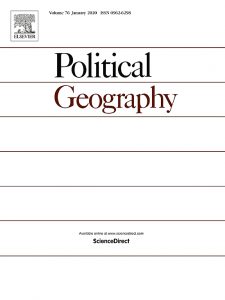China’s Belt and Road Initiative: Views from the Ground
Dr. Oliveira’s article “China’s Belt and Road Initiative: Views from the Ground” has just been published as the guest editor’s introduction to a special issue Political Geography.
The article is co-authored with Galen Murton, Alessandro Rippa, Tyler Harlan, and Yang Yang, who also co-edited the special issue.
ABSTRACT: The Chinese government promotes the Belt and Road Initiative (BRI) as a global strategy for regional integration and infrastructure investment. With a projected US$1 trillion commitment from Chinese financial institutions, and at least 138 countries participating, the BRI is attracting intense debate. Yet most analysis to date focuses on broad drivers, risks, and opportunities, largely considered to be emanating from a coherent policy imposed by Beijing. In this special issue, we instead examine the BRI as a relational, contested process – a bundle of intertwined discourses, policies, and projects that sometimes align but are sometimes contradictory. We move beyond policy-level, macro-economic, and classic geopolitical analysis to study China’s global investments “from the ground”. Our case studies reveal the BRI to be dynamic and unstable, rhetorically appropriated for different purposes that sometimes but do not always coalesce as a coherent geopolitical and geoeconomic strategy. The papers in this special issue provide one of the first collections of deep empirical work on the BRI and a useful approach for grounding China’s role in globalization in the critical contexts of complex local realities.
Political Geography is the flagship journal of political geography and advances knowledge in all aspects of the geographical and spatial dimensions of politics and the political. It was established in 1982, consistently ranks among the most high impact and well regarded journals across the disciplines of geography, history, political science, sociology, and interdisciplinary social sciences.
For the full-length article, see: https://doi.org/10.1016/j.polgeo.2020.102225
